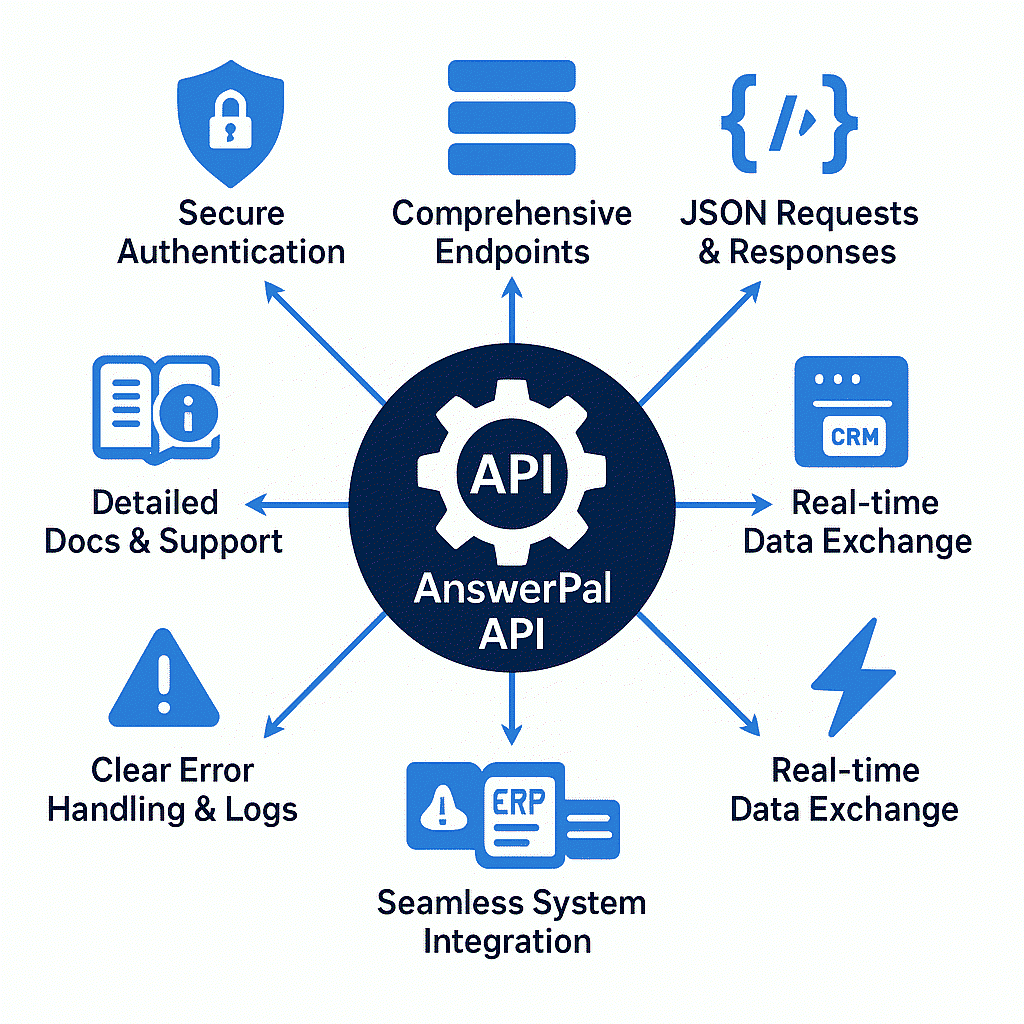API Reference
API Reference
API Reference
Welcome to the AnswerPal API Reference. Here you’ll find everything you need to integrate, automate, and extend AnswerPal using our secure and flexible RESTful API. Browse the sections below to get started, find endpoint documentation, and access best practices for robust integrations.



Introduction
AnswerPal provides a comprehensive, RESTful API to automate, extend, and integrate every aspect of your customer service, support, and communications workflows. Whether you’re building custom integrations, automating ticket handling, or connecting AnswerPal with your CRM, ERP, or other tools, our API gives you secure, flexible, and scalable access to all platform features.

RESTful JSON API
Standard HTTP methods and JSON payloads for easy integration.
Secure Authentication
Supports Basic and Bearer (JWT) authentication for all endpoints.

Real-Time Automation
Trigger workflows and actions instantly with webhooks and events.
Extensible & Flexible
Map custom fields, connect to external APIs, and tailor workflows to your needs.
Authentication
All API requests require authentication. AnswerPal supports both Basic Authentication and Bearer (JWT) tokens. Credentials can be set at the organization level or overridden for specific actions, documents, or custom fields. For details, see the Authentication section.
Endpoints Overview
Explore all API endpoints available in AnswerPal. Each group below summarizes its purpose and main API paths. Click “View Details” for complete documentation and examples.
⚙️
Actions
Manage automation actions—predefined operations triggered by workflows and events. Use these endpoints to list, create, update, and delete actions for automating replies, API calls, ticket closure, and more.
📡
Channels
Manage communication streams such as Email, Chat, Phone, and WhatsApp. Endpoints allow you to list, create, update, and delete channels, as well as manage folders and translations.
🏢
Customers
Access and manage your organization's profile, integration secrets, and available AI models. These endpoints are for retrieving and updating customer account data.
📄
Documents
Manage static documents (knowledge base, templates) and dynamic data retrieval processes. Endpoints include listing, creating, updating, and deleting documents or data retrieval definitions.
👤
End Users
Manage individuals who interact with your organization—customers, employees, or partners. Endpoints support creating, retrieving, updating, searching, and deleting end users, as well as managing their unique identifiers.
📎
File
Upload, download, and manage attachments related to ticket messages. Endpoints allow secure file handling for both end users and customer representatives.
⏰
Hooks (Events)
Automate actions triggered by specific events (“hooks”) in AnswerPal’s workflow. Endpoints let you manage event-triggered actions and documents using the SpecialTopic mechanism.
🎫
Tickets
Manage the full lifecycle of customer support tickets, including creation, updates, and retrieval. Endpoints cover ticket messages, attachments, and topic classification.
🏷️
Topics
Organize and classify conversations, tickets, or messages. Endpoints allow you to create, update, retrieve, and delete topics, and manage topic-related actions, mappings, and documents.
🌐
Translations
Manage localized UI and message translations for channels. Endpoints support retrieving and updating translations for each communication channel.
🔄
Webhooks
Webhooks enable real-time automation by notifying your systems when specific events occur in AnswerPal (such as ticket creation, escalation, or resolution). Configure webhooks to receive HTTP callbacks and trigger your own workflows or integrations.
❌
Error Codes
The AnswerPal API uses standard HTTP status codes to indicate the success or failure of API requests. See the Error Codes section for a complete list and best practices for error handling.
🚦
Rate Limits
To ensure platform stability, the API applies rate limits per customer organization. See the Rate Limits section for details, including current thresholds and how to handle rate-limited responses.
✅
Best Practices
Follow our best practices guide to ensure secure, reliable, and efficient API integrations. Topics include authentication, error handling, data validation, and performance optimization.
FAQ
Yes, all endpoints require a valid access token unless otherwise noted.
Each endpoint’s detail page includes example requests and responses.
Yes, all endpoints follow REST conventions using standard HTTP methods.
Support
Table of Contents
AnswerPal: AI-powered customer service solutions to elevate your support and communication effortlessly.
Quick Links
Contact
For all support, sales, and partnership inquiries, email us at info@answerpal.eu
AnswerPal
Bisschoppenhoflaan 380
2100 Antwerp
Belgium
+32.36416685
BE 0862.692.858

